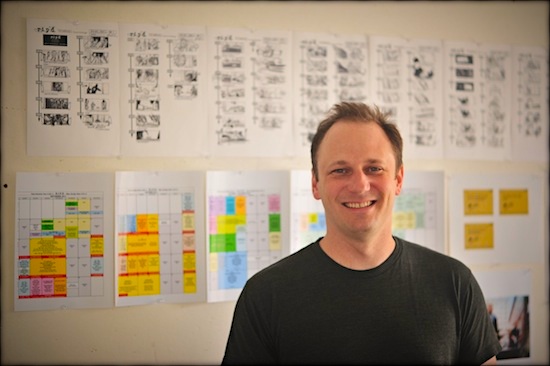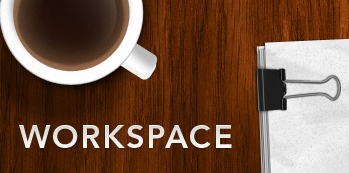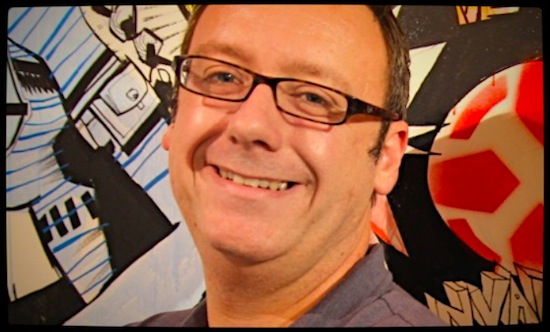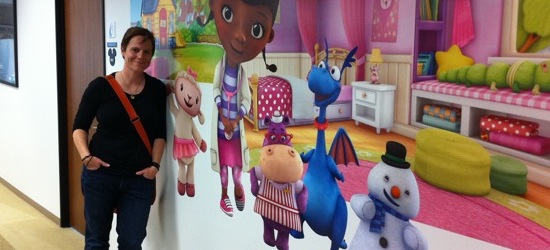 Who are you and what do you write?
Who are you and what do you write?
—-
I’m Phil Hay, a screenwriter. I write (always have) with a partner, [Matt Manfredi](http://www.imdb.com/name/nm0542062/).
At the moment, our film [R.I.P.D.](http://www.imdb.com/title/tt0790736/) is in production in Boston, and we are back and forth from here to there. We wrote, with Adam McKay, an adaptation of the great Ennis/Robertson comic The Boys. McKay is putting that together right now. We’re also working on a quasi-secret movie for Fox and an adaptation of a Japanese movie called Big Man Japan for Sony and Neal Moritz (who is, indisputably, our main man.)
Before all this, we wrote [crazy/beautiful](http://www.imdb.com/title/tt0250224/), [Aeon Flux](http://www.imdb.com/title/tt0402022/), and co-wrote the [Clash of the Titans](http://www.imdb.com/title/tt0800320/) remake, and directed a movie, [Bug](http://www.imdb.com/name/nm0006534/) (2001).
Where and when do you write?
—–
 From the beginning, Matt and I have tried to keep to a very regular schedule. We go Monday-Friday, 10-5:30 or 6 in normal times. Obviously, if in production, or when we’re close to a deadline, we can scramble into any hours.
From the beginning, Matt and I have tried to keep to a very regular schedule. We go Monday-Friday, 10-5:30 or 6 in normal times. Obviously, if in production, or when we’re close to a deadline, we can scramble into any hours.
For many years, we worked out of an office lovingly hewn from my garage. Recently, we moved to a place called “The Lot,” in West Hollywood. It looks pretty much exactly as you’d imagine a 1930s studio lot would. It’s mellow, and several of our writer and director friends are here, too, or come here when they are cutting or shooting.
We have one bigger room with two desks and a couch, and one smaller room with the corkboard and a table with chairs around it. We have a mini-fridge with beer in it, acquisition of which was a personal and professional high water mark.
My desk is piled with stuff — scripts, notes, books, scrawls. Matt’s is completely, eerily, annoyingly clean. The desks face the same direction but are angled slightly toward each other so we can talk. We used to sit directly across from each other, but I think we can all agree that that’s a bit much, right?
We’ve both realized that the immediate surroundings don’t affect us all that much. Our HQ used to be the kitchen table in an apartment we shared. At times it’s been a hotel room, a veritable broom closet at Warner Brothers, a spotless, oddly narrow room at Studio Babelsberg in Potsdam, a shivery, cavernous room with dangling electrical wires at Longcross (a tank-proving-ground- turned-studio in England,) a glass fishbowl in Boston that actually, and truly, and deeply, smells of fish.
(An interesting bit about production: during the last couple weeks of preproduction, the editorial department always comes sniffing around your office, measuring, assessing… craving. They will inevitably annex your space and kick you down the hall. 3-for-3 so far.)
But at home, going to our own office every day is a ritual that is very helpful. We always outline together, then we divide scenes and write — sometimes still in the same office, sometimes at home, sending files to each other at the end of the day. When we have the raw scenes down we manufacture a Frankenstein’s monster version, stitch it together, then come back together and work (battle) it through.
What hardware do you use?
—-
I use a previous-generation MacBook Pro, because I always, always pull the trigger on a new computer moments before the new model debuts. Matt uses a MacBook Pro of the current generation, bought two weeks later. I love all office products. I buy a lot of them, but I rarely I end up using them. Little cardboard folders, aluminum boxes (the greatest), envelopes, binders… going to Staples is like going to Toys ‘R Us. But as I said, I can’t figure out what to use them for. I guess what I’m realizing is that I love to store office products. That my true passion is for warehousing.
I truly love pens. I’ve only met one person who loves them more, and that’s [Robert Schwentke](http://www.imdb.com/name/nm0777881/), our friend and the director of R.I.P.D., who turned me on to the greatest pen in the world. Pilot G-TEC-C4. Do yourself a favor.
**Drawing pens.** I scribble and doodle a lot, maybe even obsessively, over all surfaces.
**Notebooks.** I also love notebooks. I’ve had some great composition books from Japan that have weirdly translated slogans on the front: “It must Perfection try to it” or “Information: here fell the NewHand”. I used to use those great hardcover lab books when I was in grad school. Now, I like those orange Rhodia deals that are the size of a pack of cigarettes and can fit in your back pocket.
**Freitag bag.** I got my first in Berlin, where they are very popular. They’re made of old truck tarps and seatbelts. For me, it’s the greatest computer bag in the world.
**A corkboard.** We aren’t big on notecards, but we post a 10-12 page outline sequentially on a corkboard, and kind of check it down as we are writing. We often write out of sequence — our belief is that we should write the stuff that most excites us on any given day, both because it’s more productive for us and it eventually exposes any scene that feels obligatory or dutiful — so this is really helpful. We also put storyboards up here, diagrams of action sequences, things like that.
What software do you use?
—-
[Final Draft](http://www.finaldraft.com). Never occurred to me to use anything else.
Sometimes, [iAnnotate](http://itunes.apple.com/us/app/iannotate-pdf/id363998953?mt=8), which allows you to write on PDF’s on the iPad. It’s the first thing that has come around in a while that feels like a leap forward and has made a dent in my totally locked-down habits. Still, I generally need to print a script out and make notes by hand.
What would you change?
—–
Here’s what I definitely wouldn’t change: having an extremely talented and excellent partner. He’s truly great.
What I would change: I’d write more.
I’d be less snowed under all the time by an avalanche of thoughts and fragments and 100 movies or stories I’d like to write. I’d be more methodical and I’d move on faster. No matter how much we write — and I think objectively we write pretty much — it never feels like enough. That definitely haunts me.
But I bet I have a lot of company in this feeling out there (don’t I?!). So maybe what I’d change is accepting that more. I never stop thinking about stories. Even though I feel I do 90 percent of my own work while walking around doing something else, there’s something very important about having the dedicated physical space and an ironclad ritual about attending to it every day.
Someone once told me that as a writer you’re like the proverbial Newton under the apple tree. Your job is to be there when the apple finally falls. Sometimes that is the job, just being there, putting in the hours, as many as you can. You have to be sitting there so you don’t miss it.

